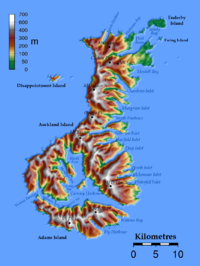
Port Ross
Encyclopedia

Auckland Island
Auckland Island is the main island of the Auckland Islands, an uninhabited archipelago in the south Pacific Ocean belonging to New Zealand. It is inscribed in the together with the other subantarctic New Zealand islands in the region as follows: 877-004 Auckland Isls, New Zealand S50.29 E165.52...
in the Auckland Islands Group
Auckland Islands
The Auckland Islands are an archipelago of the New Zealand Sub-Antarctic Islands and include Auckland Island, Adams Island, Enderby Island, Disappointment Island, Ewing Island, Rose Island, Dundas Island and Green Island, with a combined area of...
, a subantarctic chain that forms part of the New Zealand Outlying Islands
New Zealand Outlying Islands
The New Zealand outlying islands comprise nine island groups, located in the subtropics and subantarctic, which are part of New Zealand but lie outside of the New Zealand continental shelf. Although considered as integral parts of New Zealand, seven of the nine island groups are not part of any...
.
Guarding the mouth of Port Ross are Rose Island
Rose Island, New Zealand
Rose Island is an uninhabited island, part of the Auckland Islands group, a subantarctic chain that forms part of the New Zealand Outlying Islands....
, Enderby Island, Ewing Island
Ewing Island, New Zealand
Ewing Island is an uninhabited island, part of the Auckland Islands group, a subantarctic chain that forms part of the New Zealand Outlying Islands....
, and the tiny Ocean Island.
In 1842, members of the Ngāti Mutunga
Ngati Mutunga
Ngāti Mutunga is a Māori iwi of New Zealand. Their tribal lands are in north Taranaki, with the principal marae being at Urenui.Prominent leader and anthropologist Te Rangi Hīroa was of Ngāti Mutunga descent.-External links:*...
Māori arrived in Port Ross from the Chatham Islands
Chatham Islands
The Chatham Islands are an archipelago and New Zealand territory in the Pacific Ocean consisting of about ten islands within a radius, the largest of which are Chatham Island and Pitt Island. Their name in the indigenous language, Moriori, means Misty Sun...
with Moriori
Moriori
Moriori are the indigenous people of the Chatham Islands , east of the New Zealand archipelago in the Pacific Ocean...
slaves in an attempt to establish a settlement.
In the late 1840s, an agricultural
Agriculture
Agriculture is the cultivation of animals, plants, fungi and other life forms for food, fiber, and other products used to sustain life. Agriculture was the key implement in the rise of sedentary human civilization, whereby farming of domesticated species created food surpluses that nurtured the...
and whaling
Whaling
Whaling is the hunting of whales mainly for meat and oil. Its earliest forms date to at least 3000 BC. Various coastal communities have long histories of sustenance whaling and harvesting beached whales...
community set up in Erebus Cove, on the harbour, and named Hardwicke
Hardwicke, New Zealand
Hardwicke was the name of an agricultural and whaling community set up at Port Ross, a natural harbour on Auckland Island in the Auckland Islands Group in the Southern Ocean south of New Zealand. Although a short-lived settlement was established, it was abandoned within three years.-History:This...
. Due to the inhospitable climate, the settlement was abandoned within three years. A cemetery remains, later used to bury victims of shipwrecks. Survivors of the 1866 wreck of the General Grant
General Grant (ship)
The General Grant was a 1,005-ton three-masted barque built in Maine, USA in 1864 and registered in Boston, USA. She was named after Ulysses S. Grant, owned by Messers Boyes, Richardson & Co...
set up a camp in the Harbour, where they lived for 18 months before rescue. Later, castaway depot
Castaway depot
A castaway depot is a store or hut placed on an isolated island to provide emergency supplies and relief for castaways and victims of shipwrecks...
s were established in Port Ross to provide succour for any sailors wrecked or marooned on the islands. In 1887 it provided relief for the survivors of the Derry Castle
Derry Castle (barque)
The Derry Castle was a 1367 ton iron barque built at Glasgow in 1883, and initially operating out of Limerick, Ireland. In 1887 while voyaging from Australia to the United Kingdom with a cargo of wheat, it foundered off Enderby Island, in the sub-Antarctic Auckland Islands, on a reef which now...
. It was also one of three sites occupied by the wartime
World War II
World War II, or the Second World War , was a global conflict lasting from 1939 to 1945, involving most of the world's nations—including all of the great powers—eventually forming two opposing military alliances: the Allies and the Axis...
Cape Expedition
Cape Expedition
Cape Expedition was the deliberately misleading name given to a secret five-year wartime program of establishing coastwatching stations on New Zealand’s more distant uninhabited subantarctic islands...
coastwatching stations
Coastwatchers
The Coastwatchers, also known as the Coast Watch Organisation, Combined Field Intelligence Service or Section C, Allied Intelligence Bureau, were Allied military intelligence operatives stationed on remote Pacific islands during World War II to observe enemy movements and rescue stranded Allied...
established on New Zealand's subantarctic islands.

